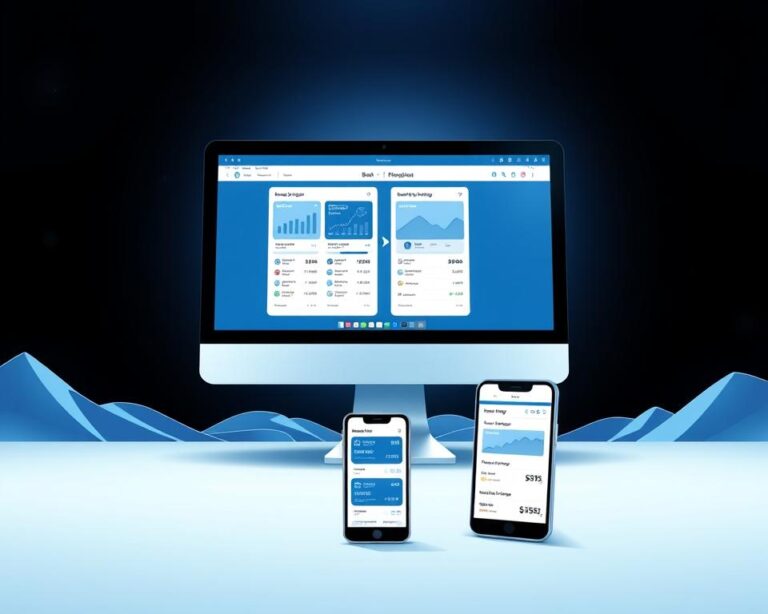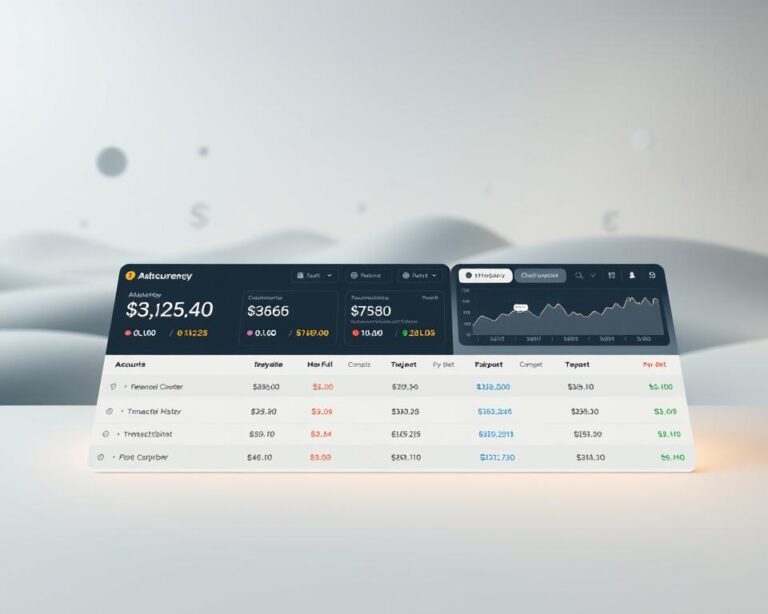Advertisement
Did you know over 40% of Americans might freelance by 2030? This change shows we need better ways to manage our money, especially for freelancers. Having a business bank account is key for freelancers. It helps keep personal and business money separate and makes managing finances easier.
Choosing the right bank is important for freelancers. It can help with sending invoices, managing money, and preparing taxes. We’ll explore the top banks for freelancers to help you pick the best one for your needs.
Understanding the Importance of Business Bank Accounts for Freelancers
For freelancers, having a business bank account is key. It keeps personal money separate from work income. This helps in organizing finances better.
Business accounts help freelancers track their money in and out. This is vital for tax time. It makes tax prep easier and shows clients you’re professional.
Having a business account helps freelancers stand out. It keeps finances organized and helps with planning for the future. This way, freelancers can make smart choices for their business.

Benefits of Having a Separate Business Bank Account
Having a separate business bank account offers many benefits of business bank accounts for freelancers. It makes bookkeeping easier by separating personal and business expenses. This helps freelancers manage their freelance finance management better, making tax time less stressful.
It also helps with budgeting and managing cash flow. With a business account, freelancers can keep an eye on their money as it comes in and goes out. This helps them make smarter financial choices and keep their business running smoothly.
Moreover, business bank accounts often come with tools like invoicing and payment processing. These tools save freelancers time by streamlining their work with clients. Overall, having a separate business bank account is more than just convenient. It’s a step towards financial freedom.

| Benefit | Description |
|---|---|
| Simplified Bookkeeping | Easier tracking of income and expenses for tax purposes. |
| Improved Cash Flow Management | Real-time monitoring of financial performance, aiding decision-making. |
| Enhanced Productivity | Access to features like invoicing and payment processing. |
| Professional Image | Establishes credibility with clients through a dedicated business account. |
Best Banks for Freelancers
Freelancers need banks that fit their unique needs. The top banks for freelancers offer great fees and tools for managing money. Knowing the benefits of different banks helps freelancers choose wisely.
Wise Business: Great for Doing Business Overseas
Wise Business is a top pick for freelancers working abroad. It has good exchange rates and low fees for transfers. This makes it easy for freelancers to handle payments.
Mercury: Tailored for Startups and Freelancers
Mercury is great for freelancers and startups. It offers free checking and savings accounts. This makes banking affordable. Plus, it works well with other financial tools.
BlueVine: High Yield Accounts with No Fees
BlueVine is known for its high-yield accounts with no monthly fees. There’s no need for a minimum balance. This helps freelancers grow their businesses without worrying about fees.
| Bank | Key Features | Fees |
|---|---|---|
| Wise Business | Low international transfer fees, quick payments | No monthly fees |
| Mercury | Free checking and savings, financial tools integration | No monthly fees |
| BlueVine | High-yield accounts, no fee structure, flexible balance requirements | No monthly fees |
Key Features to Look for in a Freelancer Bank Account
Freelancers need to pick a bank account that fits their financial needs. Look for features like transaction limits, banking integrations, and tools for managing cash flow. These can make a big difference in how well you do financially.
Transaction Limits and Fees
Freelancers should watch out for transaction limits and fees from banks. Some accounts might charge for too many transactions. Knowing these fees is important to avoid losing money.
It’s better to find accounts with no limits or lower fees. This can help keep your finances stable.
Integration with Financial Tools
Good financial management depends on easy banking integrations. Choose a bank account that works well with tools like QuickBooks. This makes invoicing and tracking expenses easier.
These integrations save time and cut down on mistakes. They let you focus on your work, not paperwork.
Cash Flow Management Solutions
Managing your cash flow is key for freelancers. Look for accounts with strong tools for tracking income and expenses. These tools help you see where your money is going.
With these tools, you can plan for the future. You’ll make better financial decisions based on what you really know about your money.
Comparing Popular Bank Accounts for Freelancers
Freelancers need to find the best banking options to manage their money well. It’s important to look at what each bank offers and what might not be so great. This helps in making a smart choice.
Chase Business Banking: Offers and Fees
Chase Business Banking has accounts for freelancers and small business owners. They offer different options to meet various financial needs. Chase also has flexible transactions and strong online banking tools.
However, freelancers should know there’s usually a monthly fee. This fee can be skipped if you keep a certain amount of money in your account. This might be good for those with steady income.
Bank of America: Features Analysis
Bank of America offers the Business Advantage Fundamentals™ account for freelancers. It has tools for tracking cash flow and mobile check deposit. There’s a monthly fee, but it can be waived if you keep a certain balance.
This could be a big plus for freelancers who manage their money well. It’s worth comparing Bank of America’s features to your business needs to see if it’s right for you.
Tips for Choosing the Right Bank Account
Freelancers need a clear plan when picking a bank account. Good tips for choosing business bank accounts help make smart choices. Start by figuring out your banking needs, like how often you make transactions and how you get paid. Knowing these details can save you time and money.
Assessing Your Business Needs
Freelancers should think about what they really need in a bank account. Important things to consider include:
- Transaction volume: Guess how many transactions you’ll do each month.
- Payment types: Decide if you mostly get paid in the US or abroad.
- Cash flow patterns: Look at when you make more or less money.
This step is key to picking an account that fits your business well.
Understanding Fee Structures
Fees can really cut into your profits. Knowing about fee structures helps you avoid extra costs. Important things to look at include:
- Monthly maintenance fees: Find accounts with low or no fees.
- Transaction fees: Check the costs for putting money in and taking it out.
- Overdraft fees: Make sure you know what happens if you go over your limit.
By comparing different accounts and their fees, freelancers can pick one that helps them manage their money better. This way, they can avoid hidden costs that might lower their earnings.
How to Open a Bank Account as a Freelancer
Opening a bank account as a freelancer can make managing your money easier and look more professional. First, collect important documents like your ID, business registration, and tax ID number. Many banks now offer quick online applications to open an account fast.
When looking to open a business bank account, check the minimum deposit and the types of accounts for freelancers. Each bank has its own rules and options. It’s important to choose one that fits your needs well.
Conclusion
Choosing the right bank account is key for freelancers. A dedicated account makes managing money easier and keeps business finances organized. With many banking options, finding the right one for your business is important.
Look at fees, transaction limits, and tool integrations when picking a bank. These details help freelancers manage their money well. The right bank can help your business grow and make money management simpler.
Understanding your banking options leads to better financial decisions. This ensures you can succeed in a competitive world. Making an informed choice now can lead to a more organized and successful freelance career later.



